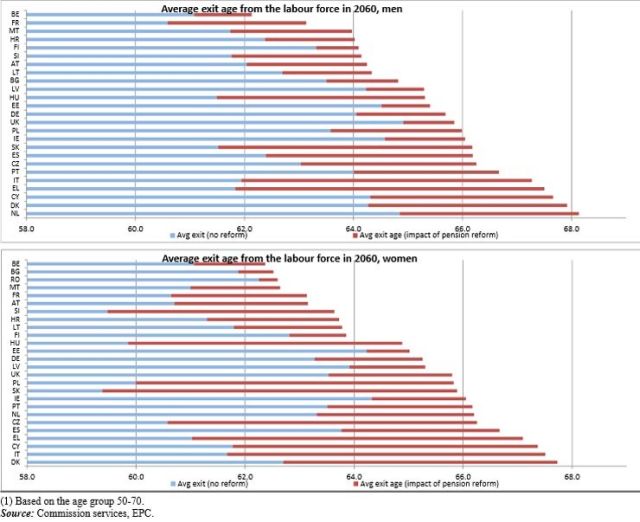Increased life expectancy, decreased share of young population, almost a zero birth rate and continuing contraction of employment, these are the main characteristics of Greece in 2060, according to a report published by the European Commission for the 28 member states of the European Union.
In particular, the data of the Commission indicate the following:
- Life expectancy will increase by 6.9% in men (to 84.9 years) and 5.7% in women (to 89 years).

- The number of people aged under 14 will decrease from 14.6% to 12.9% of the population (-1.8%). The 25-54 age group will shrink from 42.6% to 33.3% of the population (a 9.3% decrease) and the number of persons of working age (between 15-64 years) will decrease from 65.1% to 54.2% of the population (-10.9%).
- Birth rate will increase by only 0.2% from 2013 to 2060 and will be less than zero by 2030. In other words, the number of older people in the country will grow at the expense of young. It is expected that this development will exacerbate the problems in the social security and pension system, especially by 2020.
- Greece's population will shrink by 2.5% in 2060 compared to 2013. This reduction will be apparent as early as 2020, when the population will drop to 10.7 million from 11 million in 2013.
 - Immigration inflows to Greece will increase by a total of 20.6%, although they will report a decrease in the period 2013-2035. In addition, the data in the report of the European Commission show that in 2013 immigration inflows decreased by 15,900 people, in 2015 they will decrease by 21,300 compared to 2013, in 2020 by 22,300 compared to 2013, in 2025 by 17,100, in 2030 by 10,000 and in 2035 by 3,200.
- Immigration inflows to Greece will increase by a total of 20.6%, although they will report a decrease in the period 2013-2035. In addition, the data in the report of the European Commission show that in 2013 immigration inflows decreased by 15,900 people, in 2015 they will decrease by 21,300 compared to 2013, in 2020 by 22,300 compared to 2013, in 2025 by 17,100, in 2030 by 10,000 and in 2035 by 3,200.
- The potential gross domestic product (GDP) will grow by only 0.7% by 2060 compared to 2013. In 2015, the potential GDP is believed to fall by 2.8%.
- The working labour force (people aged between 15-64 years) will decrease from 7.19 million in 2013 to 7.085 million in 2015. Moreover, it is estimated that by 2060 the number of employed persons (aged between 15-94 years) will decrease to 4.639 million (i.e. by 2.551 million).
In light of these data, the viability of the social security system and the production model is of particular concern as well as the real estate market, where there are at least 250,000 unsold properties at present.
It is also clear that the low birth rate is one of the most serious problems at the European level, but the policy to deal with it is still only on paper.